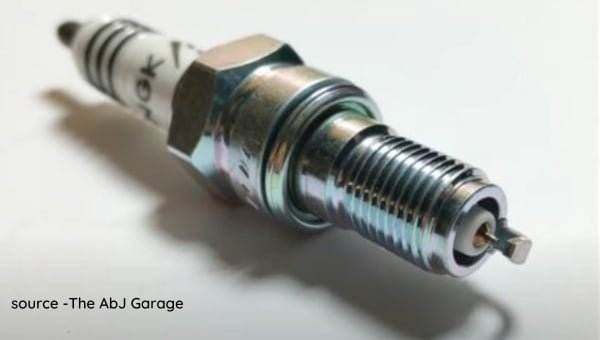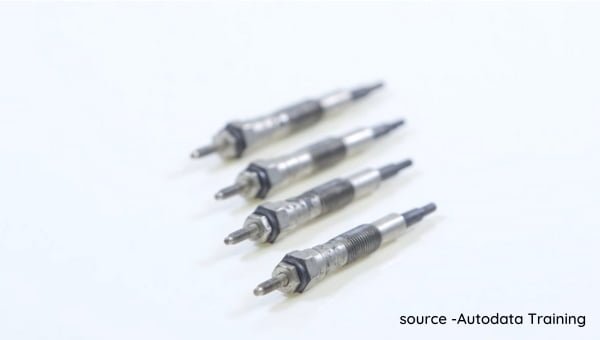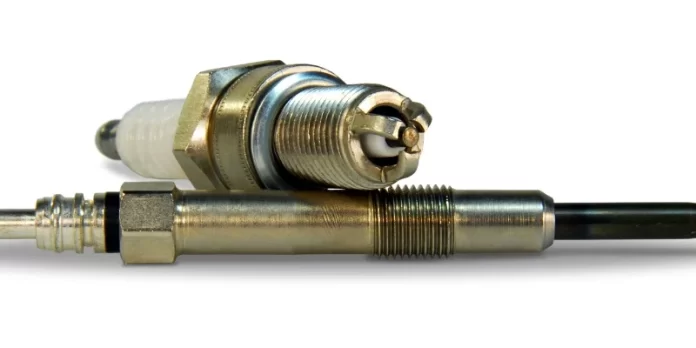Spark plugs and glow plugs are important parts of vehicle ignition systems, but they are often mixed up. Spark plugs are used in gasoline engines, but glow plugs are found in diesel engines.
Spark plugs ignite fuel-air mixtures with an electric charge, and glow plugs ignite fuel with heat.
Both are vital for a smooth engine. To make good choices when it comes to maintenance and repairs, understanding the differences between them is important.
Spark plugs are great for quick, efficient fuel ignition, making them ideal for high-performance gasoline engines.
Glow plugs take longer to heat up and require more time to warm up before igniting diesel fuel. Plus, spark plugs tend to be more durable and last longer.
The way each component works in its engine is different, too. Spark plugs deliver an electrical current that jumps across an air gap within the plug, creating a spark to ignite the air-fuel mixture in the engine’s cylinder.
Glow plugs use electrical resistance to generate heat, which is then conducted into the metal body of the plug, heating up the combustion chamber and allowing diesel fuel to ignite.
Spark plugs
To enhance your knowledge about spark plugs, the next step is to understand the function of spark plugs, the types of spark plugs, and the pros and cons of using spark plugs.
These sub-sections will provide you with an insight into the importance of spark plugs, how they vary from each other, and the advantages and disadvantages of incorporating them in your automobile.

The function of spark plugs
Spark plugs are a must-have for engines. They generate an electric spark to ignite the fuel-air mixture in the combustion chamber.
This spark is essential for the energy needed to start and keep the engine running.
Each type of spark plug has its own specs. The heat range determines how well it can dissipate heat. Using the wrong heat range could damage the engine.
Also, spark plugs are made from copper, platinum, or iridium. Each material has its pros and cons.
A car owner once shared that his car stalled due to worn-out spark plugs. Replacing them fixed the problem. This shows how important spark plug maintenance is.
Finding the right spark plug is like finding the perfect person for a blind date.
It can take some time, but when the right one is chosen, your engine will be running great!
Types of spark plugs
Spark plugs are essential for engine operations. They ignite the air-fuel mixture in the combustion chamber. Types of spark plugs include copper, platinum, iridium, and double platinum.
Copper has a copper core electrode and nickel alloy tip. It lasts for 20,000 miles and offers good performance, but is less durable than others.
Platinum has a platinum center electrode and copper/nickel alloy tip. It lasts 60,000 miles or more and has better durability and performance compared to copper.
Iridium has an iridium center electrode and platinum tip. It can reach up to 100,000 miles or more with proper maintenance.
Double Platinum has both center and ground electrodes coated with platinum. It has a lifespan of 60,000 miles or more with better durability and performance.
Specialty spark plugs are also available for specific engines and purposes. For instance, racing engines may require fine wire plugs for improved performance.
Spark plugs are a love-hate relationship with your car. You love the smooth ride but hate changing them.
Pros and cons of using spark plugs
Glow plugs are an essential part of any internal combustion engine. They ignite the air-fuel mixture to create power for the engine to run.
Though they provide benefits, there are drawbacks too.
- The main advantage of glow plugs is that they give a stable and consistent ignition, which boosts performance.
- Plus, they are cheap and easy to change out when worn or faulty.
- On the downside, glow plugs can get fouled over time due to carbon deposits, oil, and fuel residue, meaning they need more frequent replacement.
Furthermore, if the wrong type or heat range of glow plug is used, it can lead to misfires and detonation, making the engine less efficient.
My friend had a car that kept stalling at traffic signals. Turns out, the aged glow plugs were the cause. The mechanic replaced them with new ones and the car ran like a dream again.
This emphasizes the importance of glow plug health when maintaining a vehicle.
Glow plugs
To better understand glow plugs and their role in your vehicle, explore the following sub-sections: function of glow plugs, types of glow plugs, and pros and cons of using glow plugs.
These subsections aim to provide a concise insight into the critical aspects of glow plugs and enable you to make informed decisions when it comes to using them.

The function of glow plugs
Glow plugs are part of diesel engine ignition systems. They warm up the air in the combustion chamber to help start the engine and reduce misfires.
This essential component uses an electric current to heat a red-hot element.
This raises the temperature in the chamber, allowing fuel to ignite more quickly and easily. Without glow plugs, starting in colder weather would be challenging.
They also help to lower emissions by improving combustion.
Glow plugs have a unique feature – they shut off automatically when they reach a certain temperature. Amazingly, they were patented by General Motors in 1929!
Before these prototypes, drivers used open flames or charcoal heaters to warm their vehicles.
Today’s diesel engines come with advanced tech and strong materials, letting glow plugs last longer and work better.
Whether you need pencil-type, ceramic, or instant glow plugs – they all have one thing in common; they’ll light up your engine.
Types of glow plugs
Glow plugs are essential for diesel engines to start in cold weather. They work through electrical resistance to ignite fuel.
Metal rods and ceramic glow plugs differ in composition, heat capacity, and durability. Metal rod ones are simple and cheap but have shorter lifespans.
Ceramic ones contain more heat for better ignition. Different engine models need different types of glow plugs.
To keep them working well, don’t press the ignition button more than five times. Also, reduce battery load to increase battery and plug life.
Glow plugs: the ultimate way to start your engine? Or a gateway to a car addiction? You decide.
Pros and cons of using glow plugs
Glow plugs are must-haves for diesel engines. They’re heating elements that get inserted into the engine’s combustion chamber to warm up the air and help start the engine.
But, there are advantages and disadvantages.
- Pros:
- The aid engine starts even when it’s cold.
- Reduce emissions with lower temperature combustion.
- Conserve battery power by cutting down on cranking time.
- Some have a long life, giving good value.
- Easy to install – perfect for DIY-ers.
- Help improve fuel efficiency with faster ignition.
- Cons:
- Might malfunction due to high temperatures or frequent use.
- Extreme cases can cause damaged pistons or rings.
- May not work depending on the fuel type.
- More expensive than other maintenance costs.
- One malfunctioning plug can cause serious damage.
Newer car technology has improved glow plugs. Modern diesel engines use advanced combustion tech, so they don’t need glow plugs as much.
I remember my friend’s engine wouldn’t start for hours. The mechanic said the plugs couldn’t conduct enough current due to too much fuel.
Replacing them fixed the issue and it worked fine for years. It’s important to use compatible parts.
So why settle for a spark? Go with glow plugs – hotter, brighter, and more reliable.
Comparison between Spark plugs and Glow plugs
To understand the differences between spark plugs and glow plugs, and determine which is better for your vehicle, this section provides a comparison of the two types of plugs.
Differences between spark plugs and glow plugs will be explored, and we’ll discuss which of the two is a better option for different types of engines.
Differences between spark plugs and glow plugs
Spark plugs and glow plugs have definite distinctions. Let’s take a look at the following table to learn more about their differences.
| Category | Spark Plugs | Glow Plugs |
|---|---|---|
| Functionality | The spark occurs when fuel and air mixture are compressed in each cylinder of an internal combustion engine. | Generate heat to initiate diesel engine combustion. |
| Design | A metal rod with an insulated center electrode sparks from the tip to ground. | Metal rods that heat up with battery voltage. |
| Nature of Ignition | Spark occurs when fuel and air mixture are compressed in each cylinder of an internal combustion engine. | Glow plug warms wax-like material, enabling combustion to take place once it gets hot. |
Spark plugs are used in gasoline engines, and glow plugs are suitable for diesel engines. Glow plugs aid in cold weather starts as they maintain a higher temperature for longer.
Fun fact: Edmond Berger invented the first patented spark plug in 1839!
Consider spark plugs and glow plugs when selecting between a hot date or a cozy night in – it all depends on how much effort you’re willing to put in.
Which is better, spark plugs or glow plugs?
When discussing spark plugs and glow plugs, it’s not a matter of which is better. Rather, it’s a matter of which is more suitable for the engine’s needs. Let’s look into the details of the two types.
The table shows how spark plugs and glow plugs differ:
| Plug Type | Engine Type |
|---|---|
| Spark Plugs | Gasoline-powered engines |
| Glow Plugs | Diesel engines |
Regarding performance, spark plugs generate more power. But for fuel economy and cold starts, glow plugs come out on top due to lower energy consumption and preheating capability.
So, what is “better?” It depends on the engine type and the temperature range.
My friend owns a Toyota Camry with misfires. He replaced the ignition coil and other parts, but the engine still had low power.
Changing his spark plugs fixed it. He went back to the original spark plugs for his car and now gets smooth rides.
Spark plugs and glow plugs may both start your engine, but only one will light up your life.
Final words
When picking between spark and glow plugs, it’s key to know the differences and pick appropriately. Spark plugs are for gasoline engines; glow plugs are for diesel engines.
Both serve the same purpose of igniting fuel; they just work differently. A spark plug generates a spark when an electrical current is sent to it.
A glow plug warms up the air/fuel mixture with electricity, to make it ready for ignition.
Glow plugs take longer to warm up than spark plugs, so they’re used in cooler weather. Also, some diesel engines need multiple glow plugs for ignition.
Charles F. Kettering invented the first spark plug in 1902, which changed internal combustion engine design forever.
Bigger vehicles such as trucks and trains used gasoline vehicles due to this invention during WWI. However, Volkswagen released its first diesel car with a single-plug cylinder head design in 1976.
FAQs
What is the main difference between spark plugs and glow plugs?
Spark plugs are used in gasoline engines to ignite the fuel mixture, while glow plugs are used in diesel engines to heat the air in the combustion chamber for starting.
Can spark plugs be used in diesel engines?
No, spark plugs cannot be used in diesel engines because they are not designed to withstand the high compression ratios and temperature differences in diesel engines.
Are glow plugs necessary for starting a diesel engine?
Yes, glow plugs are necessary for starting a diesel engine because they heat the compressed air in the combustion chamber, making it easier to ignite the fuel mixture.
How often should spark plugs be replaced?
The frequency of spark plug replacement varies depending on the make and model of the vehicle and driving conditions. It is recommended to replace spark plugs every 30,000 to 100,000 miles.
How long do glow plugs last?
The lifespan of glow plugs depends on the quality of the plug and driving conditions. On average, glow plugs can last up to 100,000 miles or more.
What are the signs of a malfunctioning spark plug or glow plug?
Signs of a malfunctioning spark plug can include poor fuel economy, misfires, rough idling, and difficulty starting the engine. Signs of a malfunctioning glow plug can include difficulty starting the engine, white smoke from the exhaust, and a decrease in power and acceleration.



